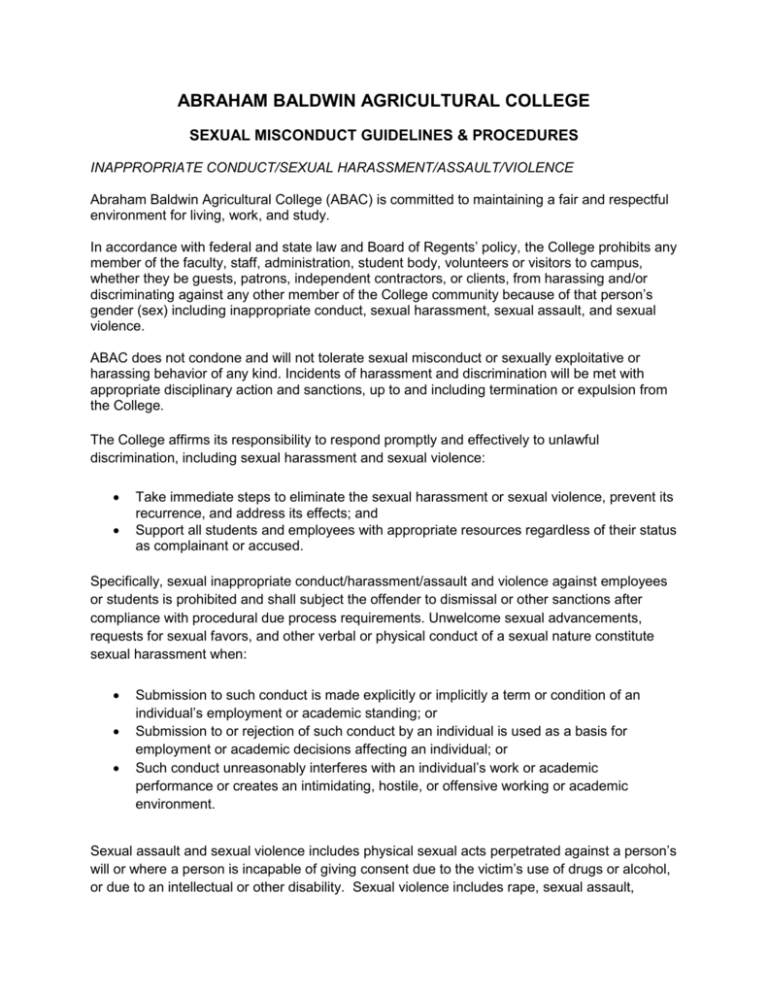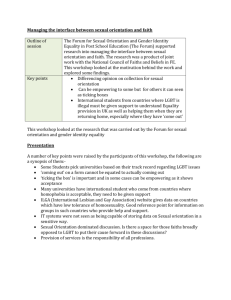
ABRAHAM BALDWIN AGRICULTURAL COLLEGE
SEXUAL MISCONDUCT GUIDELINES & PROCEDURES
INAPPROPRIATE CONDUCT/SEXUAL HARASSMENT/ASSAULT/VIOLENCE
Abraham Baldwin Agricultural College (ABAC) is committed to maintaining a fair and respectful
environment for living, work, and study.
In accordance with federal and state law and Board of Regents’ policy, the College prohibits any
member of the faculty, staff, administration, student body, volunteers or visitors to campus,
whether they be guests, patrons, independent contractors, or clients, from harassing and/or
discriminating against any other member of the College community because of that person’s
gender (sex) including inappropriate conduct, sexual harassment, sexual assault, and sexual
violence.
ABAC does not condone and will not tolerate sexual misconduct or sexually exploitative or
harassing behavior of any kind. Incidents of harassment and discrimination will be met with
appropriate disciplinary action and sanctions, up to and including termination or expulsion from
the College.
The College affirms its responsibility to respond promptly and effectively to unlawful
discrimination, including sexual harassment and sexual violence:
Take immediate steps to eliminate the sexual harassment or sexual violence, prevent its
recurrence, and address its effects; and
Support all students and employees with appropriate resources regardless of their status
as complainant or accused.
Specifically, sexual inappropriate conduct/harassment/assault and violence against employees
or students is prohibited and shall subject the offender to dismissal or other sanctions after
compliance with procedural due process requirements. Unwelcome sexual advancements,
requests for sexual favors, and other verbal or physical conduct of a sexual nature constitute
sexual harassment when:
Submission to such conduct is made explicitly or implicitly a term or condition of an
individual’s employment or academic standing; or
Submission to or rejection of such conduct by an individual is used as a basis for
employment or academic decisions affecting an individual; or
Such conduct unreasonably interferes with an individual’s work or academic
performance or creates an intimidating, hostile, or offensive working or academic
environment.
Sexual assault and sexual violence includes physical sexual acts perpetrated against a person’s
will or where a person is incapable of giving consent due to the victim’s use of drugs or alcohol,
or due to an intellectual or other disability. Sexual violence includes rape, sexual assault,
sexual battery, and sexual coercion. Sexual assault and sexual violence reports will result in
both a criminal investigation and a timely institutional investigation. There is no geographical
limitation to this policy. This applies to any complaint of sexual misconduct against a student or
employee no matter the distance from campus.
PERSONS WHO MAY BE INVOLVED IN SEXUAL HARASSMENT
Sexual harassment most frequently occurs when a person in authority harasses someone with
less power, e.g., faculty member and student, administrator and faculty member, supervisor and
staff member. However, it is possible for a person with less power to harass a person in
authority. Sexual harassment may also take place between persons of the same status, e.g.,
faculty-faculty, student-student, staff-staff. It may take place between persons of the opposite
sex, or between persons of the same sex.
REPORTING OF ISSUES AND CONFIDENTIALITY
The college encourages all students and employees to immediately report issues of
inappropriate conduct and harassment based upon protected factors including gender or sex.
Victims of sexual assault or violence should immediately report issues to the ABAC Police
Department or call 911 if off campus. Victims who report sexual assault and violence will not be
subject to normal Student Judiciary Process sanctions for drug and alcohol violations.
Counseling and support are available through ABAC confidential employees who will not divulge
information to authorities; this includes both the Director and the Professional Counselor in the
Office of Student Development and Counseling.
Other reporting resources include ABAC responsible employees who will maintain as much
confidentiality as possible, but must report issues to authorities. This includes all Managers,
Deans and Department Heads, Academic and Department Administrative Assistants,
Community Assistants (CA’s), and employees within the ABAC Student Health Center.
ACADEMIC FREEDOM AND FREEDOM OF EXPRESSION
ABAC is committed to protecting, maintaining and encouraging both freedom of expression and
full academic freedom of inquiry, teaching, service, and research. However, these freedoms
come with a responsibility that all members of the education community benefit from these
freedoms without intimidation. In recognition and support of academic freedom for faculty in the
pursuit of teaching, academic freedom and freedom of expression shall be strongly considered
in investigating and reviewing complaints and reports of discrimination and/or harassment.
However, raising issues of academic freedom and freedom of expression will not excuse
behavior that constitutes a violation of federal legally protected areas which include gender and
sex, USG Policies, and ABAC Sexual Misconduct Guidelines & Procedures.
PROHIBITION AGAINST RETALIATION
Students and employees who, in good faith, report what they believe to be discrimination or
harassment, or who cooperate in any investigation, will not be subjected to retaliation. Any
student or employee who believes he or she has been the victim of retaliation for reporting
discrimination or harassment or cooperating in an investigation should immediately contact the
Title IX Coordinator. Any person who makes a fraudulent report is a violation and subject to
sanctions. Any person found to have retaliated against a person who has cooperated in an
investigation will be in violation and will be subject to disciplinary action.
Sexual Misconduct by students and other inappropriate conduct involving protected factors
(race, color, national origin, gender or sex, disability, religion, age, veteran status, and genetic
information) will be investigated by the Dean of Students/Deputy Title IX Coordinator outside of
the Student Judiciary System. Complaints involving employees will be investigated by the
Director of Human Resources.
A. Definition of Sexual Misconduct. Sexual misconduct encompasses a broad range of
unwelcome behaviors that are committed without consent or by force, intimidation,
coercion, or manipulation. The term includes, but is not limited to, criminal sexual
assault, sexual harassment, sexual exploitation, and sexual intimidation. +Sexual
misconduct can be committed by men or women, and it can occur between people of the
same or different sex.
B. Consent. Consent is a freely and affirmatively communicated willingness to participate in
particular sexual activity or behavior, expressed either by words or clear, unambiguous
actions. “Non-consent” means without either explicit verbal consent or overt action
clearly expressing consent. Such signals of consent must be mutual and ongoing, as
well as offered freely and knowingly. If at any time during a sexual interaction any
confusion or ambiguity should arise on the issue of consent, the sexual initiator should
stop and clarify the other individual’s willingness to continue. Non-communication
constitutes lack of consent.
C. Persons unable to give consent. By definition, the following conditions cause a person to
be unable to give consent:
1. Persons who are asleep or unconscious;
2. Persons incapacitated by drugs, alcohol, or medication;
3. Persons who are unable to communicate consent due to a physical or mental
impairment;
4. Persons who have been threatened or coerced into giving their consent; or
5. Persons under the age of 16.
Engaging in sexual activity with someone who is unable to give consent is considered by
law to be sexual misconduct. Indications of consent are irrelevant if the person is
incapacitated. When there is ambiguity about whether consent has been given, a person
can be charged with, and found responsible for, committing a sexual assault or another
form of sexual misconduct.
Examples of incapacitation include, but are not limited to, being highly intoxicated,
passed out, or asleep. Consumption of alcohol, in and of itself, does not relieve a person
of the responsibility to obtain ongoing consent.
Victims of sexual assault or violence will not be subject to student alcohol or drug
offenses with Student Judiciary System.
D. Examples of Sexual Misconduct. Sexual misconduct may vary in its severity and
consists of a range of behaviors or attempted behaviors. Sexual misconduct includes,
but is not limited to, the following examples of prohibited conduct as further defined
below:
1. sexual assault (paragraph E )
2. sexual harassment (paragraph F )
3. sexual exploitation (paragraph G )
E. Definition of sexual assault. Sexual assault is a form of sexual misconduct and
represents a continuum of conduct that includes non-consensual sexual contact
between an individual and another person. Examples of sexual assault under this policy
include, but are not limited to, the following behaviors, if non-consensual:
1. Sexual intercourse;
2. Any sexual touching, including penetration, with any object. Sexual touching is
contact of a sexual nature, however slight;
3. Touching of intimate body parts such as mouth, genitalia, groin, breast, buttocks,
inner thighs, or any clothing covering them;
4. The removal of another person's clothes;
5. Touching a person with one's own intimate body parts;
6. Compelling another to touch one's intimate body parts.
F. Definition of sexual harassment. Sexual harassment is a form of misconduct that
includes verbal, written, or physical behavior of a sexual nature, directed at someone, or
against a particular group, because of that person’s sex, or based on gender stereotypes
when that behavior is unwelcome. Sexual harassment may include unwelcome sexual
advances, unwelcome requests for sexual favors, and other unwelcome conduct of a
sexual nature where:
1. Submission to or tolerance of such conduct is made either an explicit or implicit
term or condition of employment or student admission, enrollment, participation,
or programming;
2. Submission to or tolerance or rejection of such conduct is used as a basis for
employment or for academic, athletic, or other educational decisions affecting an
individual;
3. The conduct has the purpose or effect of substantially interfering with an
individual’s work or academic, athletic, or other educational performance; or
4. The conduct creates an intimidating, hostile, or offensive work or educational
environment.
If in the past a person has welcomed sexual advances or other harassing conduct
(whether sexual or otherwise) by active participation in or encouragement of such
activity, he/she should specifically inform the alleged harasser if such conduct is no
longer welcome in order for any subsequent conduct to be deemed
unwelcome. However, failure to give such notice does not prevent ABAC officials from
taking appropriate corrective and/or disciplinary action against the alleged harasser for
his/her behavior.
G. Definition of sexual exploitation. Sexually exploitative behavior which occurs when a
person takes non-consensual or abusive sexual advantage of another for his/her own
benefit, or to benefit anyone other than the one being exploited. Examples of sexual
exploitation include, but are not limited to, engaging in voyeurism; forwarding of
pornographic or other sexually inappropriate material via email or other channels to nonconsenting students/groups; and any activity that goes beyond the boundaries of
consent, such as recording of sexual activity, letting others watch consensual sex, or
knowingly transmitting a sexually transmitted disease (STD), including HIV, to another.








